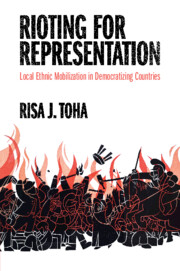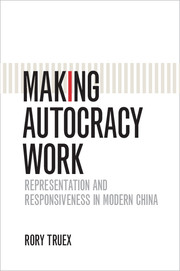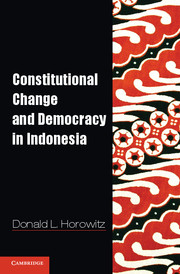Rioting for Representation
Local Ethnic Mobilization in Democratizing Countries
$34.99 USD
Part of Problems of International Politics
- Author: Risa J. Toha, Yale-NUS College, Singapore
- Date Published: October 2021
- availability: This ISBN is for an eBook version which is distributed on our behalf by a third party.
- format: Adobe eBook Reader
- isbn: 9781009020084
Find out more about Cambridge eBooks
$
34.99 USD
Adobe eBook Reader
Other available formats:
Hardback, Paperback
Looking for an inspection copy?
This title is not currently available on inspection
-
Ethnic riots are a costly and all too common occurrence during political transitions in multi-ethnic settings. Why do ethnic riots occur in certain parts of a country and not others? How does violence eventually decline? Drawing on rich case studies and quantitative evidence from Indonesia between 1990 and 2012, this book argues that patterns of ethnic rioting are not inevitably driven by inter-group animosity, weakness of state capacity, or local demographic composition. Rather, local ethnic elites strategically use violence to leverage their demands for political inclusion during political transition and that violence eventually declines as these demands are accommodated. Toha breaks new ground in showing that particular political reforms—increased political competition, direct local elections, and local administrative units partitioning—in ethnically diverse contexts can ameliorate political exclusion and reduce overall levels of violence between groups.
Read more- Applies a mixed-methods approach, combining a large-n statistical analysis of local administrative units in Indonesia over a large period of time and interview-based controlled case comparison
- Provides evidence from Indonesia, which heretofore has been understudied in the literature of conflict and political violence
- Offers possible institutional solutions to conflict
Reviews & endorsements
'Riots and Representation uses rich data and careful fieldwork in Indonesia to shed new light on the old problem of ethnic conflict during political transitions. Rather than attributing violence to regime, emotions, or economic grievances, Risa Toha shows convincingly that political actors use violence together with other strategies to seek recognition and accommodation during moments of political change.' Tom Pepinsky, Walter F. LaFeber Professor of Government and Public Policy, Cornell University
See more reviews'All too often, democratic transitions are accompanied by ethnic violence. Risa Toha persuasively argues and meticulously demonstrates that in Indonesia, the largest country to democratize since the Cold War, transitional violence was less an expression of ethnic hatred than of political voice. Her central lesson that young democracies must quickly build new institutions to secure widespread political inclusion should resonate far beyond Indonesia's shores.' Dan Slater, Ronald and Eileen Weiser Professor of Emerging Democracies, University of Michigan
'Risa Toha offers a satisfyingly straight-forward explanation for ethnic rioting across sub-national districts in Indonesia during democratic transition. Accounting for specific features of Indonesia, Toha's parsimonius explanation generates a surprising number of implications, which are tested using a mix of methodological approaches. In this rich account of Indonesian politics, the author reminds us of the importance of a grounded understanding of local politics. This book offers a framework that likely will elucidate sub-national variation of ethnic political rioting across many other ethnically diverse political transitions.' Jóhanna Kristín Birnir, Professor, Department of Government and Politics, University of Maryland
'What causes inter-group violence in Indonesia and other transitional democracies? Showing why explanations often derived from other institutional contexts just don't work, Risa Toha's new book convincingly demonstrates that violence in Indonesia has been the tactic of local and excluded political groups. The good news, though, is that various tactics of political inclusion have been effective in reducing violence once it breaks out. A must read for all those interested in Indonesia, and in the broader causes of ethnic violence.' Steven Wilkinson, Nilekani Professor of India and South Asian Studies, Yale University
'Toha's analysis, especially the relationship between decentralization and violence, is an impressive addition to the literature on riots. It should be widely read.' Ashutosh Varshney, Pacific Affairs
Customer reviews
Not yet reviewed
Be the first to review
Review was not posted due to profanity
×Product details
- Date Published: October 2021
- format: Adobe eBook Reader
- isbn: 9781009020084
- availability: This ISBN is for an eBook version which is distributed on our behalf by a third party.
Table of Contents
1. Introduction
2. Exclusion and violence during democratic transitions
3. The emergence of identity-based cleavages in Indonesia
4. Ethnic politics in Soeharto's new order regime
5. Golkar's dominance and ethnic riots
6. Micro dynamics of exclusion and riots
7. How riots dissipated
8. Conclusion
Glossary
References: Index.
Sorry, this resource is locked
Please register or sign in to request access. If you are having problems accessing these resources please email [email protected]
Register Sign in» Proceed
You are now leaving the Cambridge University Press website. Your eBook purchase and download will be completed by our partner www.ebooks.com. Please see the permission section of the www.ebooks.com catalogue page for details of the print & copy limits on our eBooks.
Continue ×Are you sure you want to delete your account?
This cannot be undone.
Thank you for your feedback which will help us improve our service.
If you requested a response, we will make sure to get back to you shortly.
×







